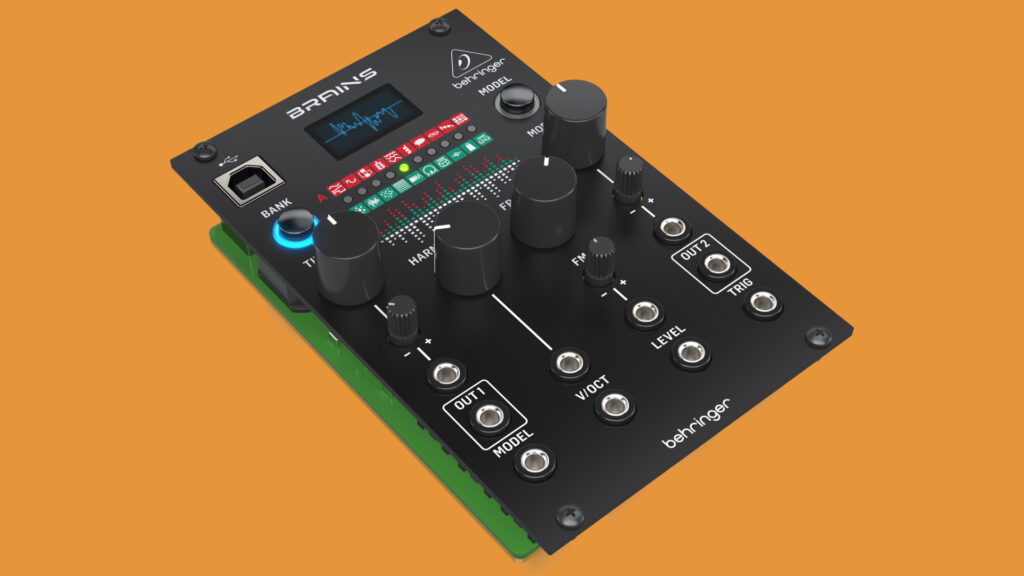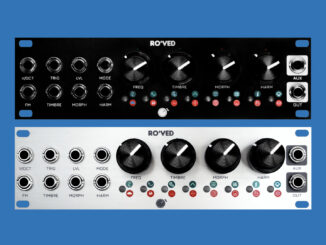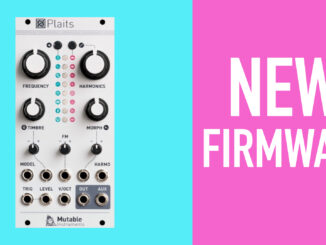Behringer Brains is a macro oscillator based on the open-source Mutable Instruments Plaits module, but expanded with 5 new codes, OLED display…
Today is June 15, the day on which Behringer promised us a new product. The rumors ranged from a new digital synthesizer, new Groovebox, free DAW to a Mutable Instruments Plaits clone. The part who believed the latter was right.
Behringer has today published the Brains, a new macro oscillator that takes inspiration from the open-source Mutable Instruments Plaits oscillator. Expanded with five new algorithms, an OLED display, USB port, and newly designed interface.
Behringer Brains
Brains is a new 16HP macro oscillator for the Eurorack format. For the sound engine, Behringer uses the Mutable Instruments Plaits module, which is loved by many. The module includes 20 digital oscillator algorithms including 15 from the open-source MI Plaits. You get:
- 10 synth engines: Virtual Analog, Waveshaper, FM, Grains, Additive, Chords, Speech, Karplus, Hypersaw and Wavetable
- 10 percussion and noise engines: Rain, Noise, Dust, Modal Strings, FM Drum, Bass, Snare, Hi-Hat, Cowbell and Tom
What is noticeable is that the module is significantly larger than the original. It has 16HP instead of 12HP and an OLED display. This is basically an oscilloscope that gives you a real-time representation of the waveforms, which I like a lot. The controls are the same as in the original, nothing has been expanded or further developed here. You get timbre, harmonics, frequency, and morph controls plus dedicated CV controls. Like Plaits, it includes attenuators on the timbre, frequency, and morph.
Brains has two separate audio outputs for both main sound and a dynamic variant. One difference should also be mentioned. Instead of updating firmware via audio, Behringer added a USB port for this task.
Mutable Instruments Plaits Clone?
Behringer is not doing anything wrong here at first look, as Emilie Gillet’s code is open-source. To be honest, B is not the first company to copy the Mutable Instruments Plaits oscillator. A quick look at Modular Grid gives you a good overview of how many small developers have recreated Plaits. However, the word small is important to mention here. So far, the module has only been copied by small companies often operated by one person. Behringer is the first to offer it in huge quantities.
Emilie Gillet’s idea is to pass on the code so that other developers can develop it further or even incorporate it into new projects. Preferably in non-commercial products. The MicroFreak also has parts of the Plaits oscillator in it and was rather poorly accepted by the community at the beginning. There were other reasons as well for this.
I leave it up to you whether you think Brains is good or bad. Since there are numerous Plaits clones in the free market, I don’t see it as a major problem. Unfortunately, this is the danger of open source. What I’m sorry about, however, is that such a talented developer as Emilie Gillet has nothing from this mass product, except for a mention in the features on the website. And personally, I think the product is not very original, although Behringer has enough manpower to bring innovative products to the market.
Behringer Brains is available soon for $149 USD.
More information here: Behringer
Available for pre-order at our partner






Thats very disapointing. I expected some sort of sequencer. I don’t need a 16hp (way to huge) plaits.
Ah, a MI clone. At least they’re cloning a discontinued module, and it is open source. Still, I feel bad because MI is a small company and a really “nice” company at that (I made a Shruthi and an Anushri years ago).
Edit: Whoops, I see it’s a clone of Plaits rather than Braids. Now I feel worse about this.
B is a company without a soul. So it would be better to choose a open source license that excludes Behringer.
Curious to see if Behringer will make his design open-source too, as the CC-BY-SA license that Mutable/Gillet uses imposes.
https://creativecommons.org/licenses/by-sa/3.0/
Nope as the code is under the MIT License which doesn’t require to re-publish it. The MicroFreak is also not available.
Ah indeed, you’re right. The CC-BY-SA is only for the hardware design. Damn, I found it such a great idea: force everyone who wants to use your design to make it open source too. The big ones won’t copy you as they are not into open source, while the small developers community can freely use and build further on your work. A bit too bad.
CC licenses aren’t intended for circuits and stuff. Urban legend. This is not a copyright issue. At best the CC license applies to original faceplate gfx.
It’s not a copy-right issue, as it is open-source. I’m pretty sure Behringer made a new circuit for it.
it seems you cant change model of the oscillator by cv on this one?
ah.you can. i just did not see it before
This statement has no basis:
“Emilie Gillet’s idea is to pass on the code so that other developers can develop it further or even incorporate it into new projects. Preferably in non-commercial products.”
The license used allows commercial use.
Dive a bit into the open-source synth community and check how it works. The developers share the codes to help other developers to learn from these developments. Yes, you can use it commercially but it has a bad taste to me and others. If every company acts like that, many developers will stop sharing codes. It’s simple. And if you know Emilie’s philosophy of developing modules, you know that wasn’t their goal that a big one takes it and market it big. Similar to the Arturia MicroFreak. Because she did most of the work on the code side on the Brains.